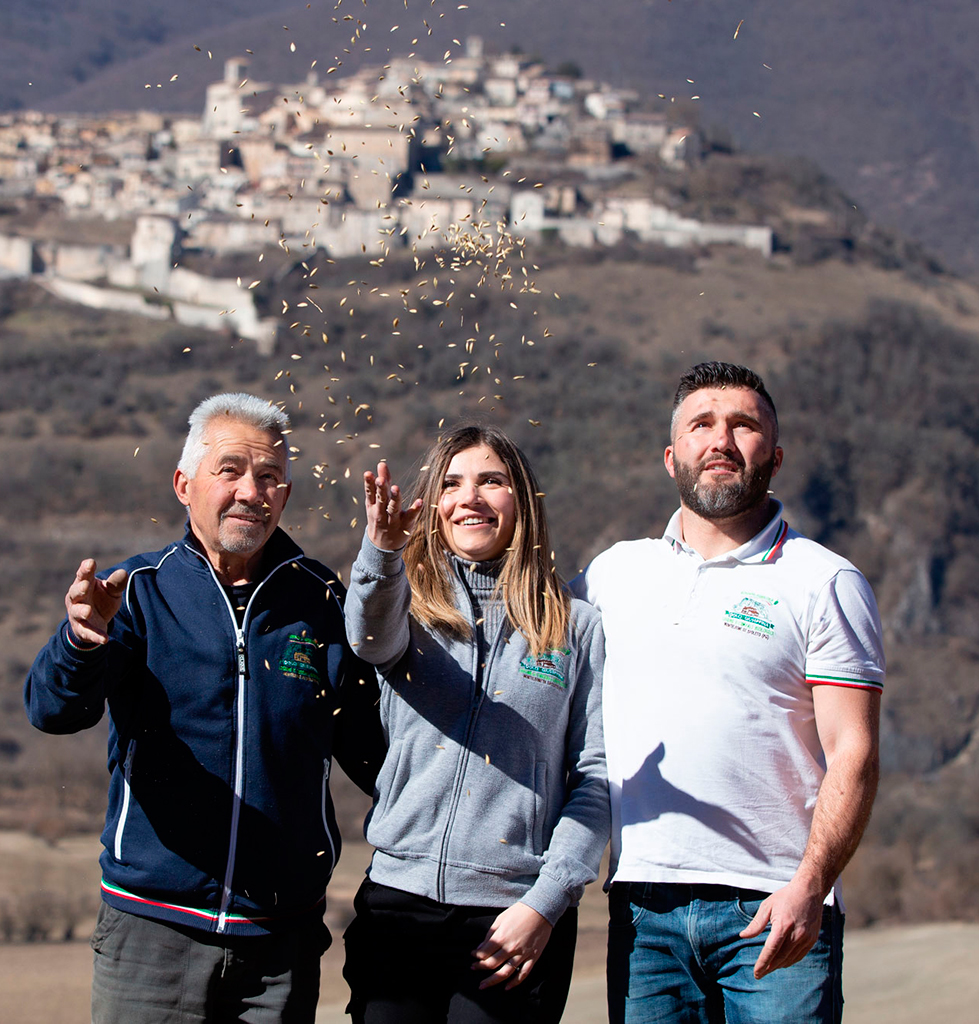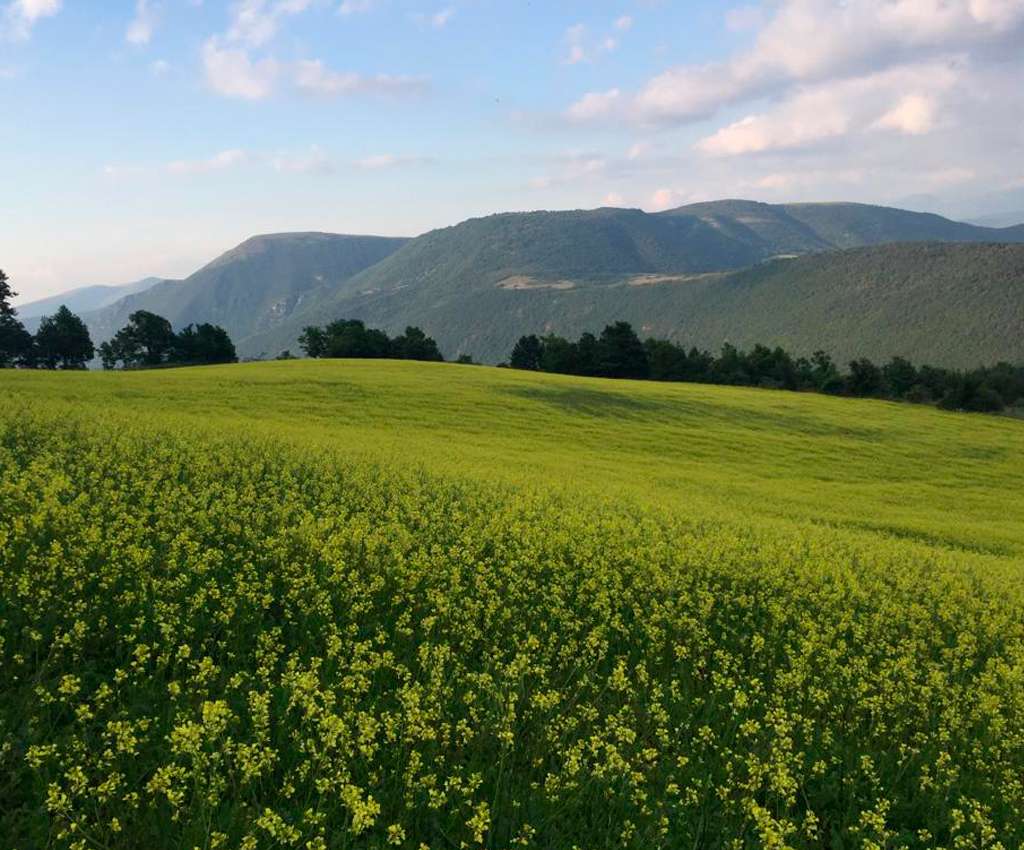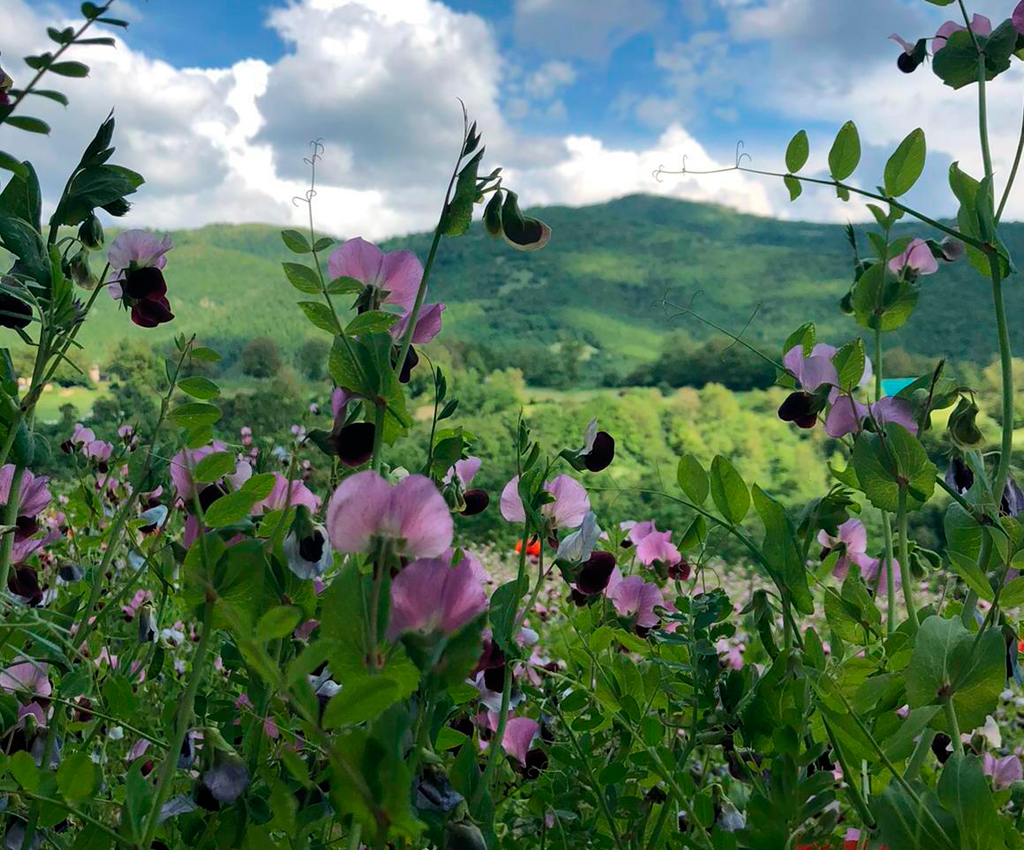For 20 years, the Angelini family has been managing a farm in the area of central Apennines in Umbria in the surroundings of an ancient village, Monteleone di Spoleto, famous for its production of local varieties of cereals and legumes. The farm was founded by Dolci Giuseppina, whose name it takes after. Her husband and two children, Domenico and Gloria, have all helped develop the farm. Tourists who arrive to this beautiful area in the spring and summer enjoy the products from the farm, for their genuine taste and for the beauty of the environment. The earthquakes in 2016 brought with them challenges to the life and work of the family, which almost caused them to leave. In the end, they decided to stay, and work on reshaping and rebuilding the farm.
![]() Name: Domenico Angelini.
Name: Domenico Angelini.
![]() Birth year: 1983.
Birth year: 1983.
![]() Gender: Male.
Gender: Male.
![]() Education: High School.
Education: High School.
![]() Occupation: Farmer (full time).
Occupation: Farmer (full time).
![]() Farm location: Monteleone di Spoleto (950 meters above sea level) 06045 Fraz. Trivio.
Farm location: Monteleone di Spoleto (950 meters above sea level) 06045 Fraz. Trivio.
![]() Farm Area in ha: 56 ha.
Farm Area in ha: 56 ha.
![]() Farm description: The family farm is located in a mountain area in Umbria, producing traditional herbs, honey, cereals, and legumes of the area, such as lentils, beans and chickpeas. Two special legumes that are typical in the Apennines are Lathyrus sativus “Cicerchia” and Pisum sativum ssp. Arvense “Roveja”. Additionally, they cultivate a local ecotype of emmer wheat (Triticum dicoccum), that has been recently recognized as a Protected Denomination of Origin (PDO). Saffron is also cultivated on-farm, as it is another specialty of this region. All products are grown and certified as organic agriculture and all processes, from harvesting to storage and packaging, are conducted on-farm by the family. Beekeeping is also a farming activity which yields high quality mountain honey, bottled and sold directly.
Farm description: The family farm is located in a mountain area in Umbria, producing traditional herbs, honey, cereals, and legumes of the area, such as lentils, beans and chickpeas. Two special legumes that are typical in the Apennines are Lathyrus sativus “Cicerchia” and Pisum sativum ssp. Arvense “Roveja”. Additionally, they cultivate a local ecotype of emmer wheat (Triticum dicoccum), that has been recently recognized as a Protected Denomination of Origin (PDO). Saffron is also cultivated on-farm, as it is another specialty of this region. All products are grown and certified as organic agriculture and all processes, from harvesting to storage and packaging, are conducted on-farm by the family. Beekeeping is also a farming activity which yields high quality mountain honey, bottled and sold directly.
All products are currently stored and packed in small rooms within the farmhouse.
Before the earthquakes of 2016 in the central Apennines the products were all sold on-farm to visitors and tourists, but after those destructive events the only opportunity was to sell the products was to participate in farmers markets in Northern Italy, mainly in Lombardia and Friuli-Venezia Giulia, were the products are highly valued.
The earthquakes in 2016 had devastating impacts beyond the physical infrastructure. Tourists were closed off to the area, and as the primary source of income for the family, via direct on-farm sales, their main consumer base suddenly disappeared. Despite those difficulties, Domenico and his family decided to stay and restart their business with new projects. Meanwhile, the success of selling at markets in northern Italy provided a new opportunity and new customers. The two main projects for rebuilding were i) to build a shed for conditioning, processing and packaging of crops and honey and ii) to transform a terrace of the farmhouse with a magnificent view of the surrounding landscape into a place for customers to taste their farm products. The first project was submitted for funding to the Region Umbria by means of two measures of the Rural Development Plan, 6.1.1 for the first instalment of the young farmers and 4.2.1 for the support to investments for transformation, commercialization and development of agricultural products, with additional benefits due to disadvantaged areas. The second project, for its specific characteristics, could be not included in the RDP measures, so Domenico applied for a crowd funding campaign entitled “Alleva la Speranza (Raise hope!) Plus” (https://www.planbee.bz/it/progetti/dettaglio/138-domenico-angelini) based on an ongoing successful initiative sponsored by Legambiente Italy in collaboration with the energy corporate ENEL. The donors were mostly loyal customers who appreciate regionally-specific food products, and are waiting for the new pandemic emergency to pass to visit the places and food products they have helped to support. With 75€ contribution the donor will get at home a pack with the farm products and with 500€ the donor will be hosted with family for tasting on the farm terrace.
Domenico recommends for farmers to be prepared for all the requirements and skills needed to manage regionally-specific production and sales. Customers must be considered as guests on the farm, and the farm’s connection to territory must be presented in the most realistic and complete way. Traditional quality products and land where they belong should be presented as a unique and indivisible package for the patrons.
![]() Training experiences and gaps: Domenico learnt from his father the main management skills required to lead a farm, as well as agronomic techniques and practices required to work the land and cultivate various crops. From his family, he also inherited the love and strong bond for the land, which have contributed to the drive to promote local food production as a main resource in that mountainous area. The course for professional agricultural entrepreneurs stimulated and enhanced his skills and competences for farm management. Domenico has also increased his in-depth knowledge of traditional crops, by promoting the biodiversity of that area. Beekeeping, for example, is a way to promote the natural ecosystem, and contribute to the pollination and growth of special breeds and native plants, as well as producing a high-quality mountain honey. He has had to refine many skills in preparation of the dossier for the PDO “Farro di Monteleone di Spoleto,” and he has had to increase his engagement in networking with other farmers for their resilience against the earthquakes and the pandemic. Finally, the experience of putting together an application for the RDP funds and the crowdfunding has stimulated his professional competence on financial tools, which are useful for farm improvement.
Training experiences and gaps: Domenico learnt from his father the main management skills required to lead a farm, as well as agronomic techniques and practices required to work the land and cultivate various crops. From his family, he also inherited the love and strong bond for the land, which have contributed to the drive to promote local food production as a main resource in that mountainous area. The course for professional agricultural entrepreneurs stimulated and enhanced his skills and competences for farm management. Domenico has also increased his in-depth knowledge of traditional crops, by promoting the biodiversity of that area. Beekeeping, for example, is a way to promote the natural ecosystem, and contribute to the pollination and growth of special breeds and native plants, as well as producing a high-quality mountain honey. He has had to refine many skills in preparation of the dossier for the PDO “Farro di Monteleone di Spoleto,” and he has had to increase his engagement in networking with other farmers for their resilience against the earthquakes and the pandemic. Finally, the experience of putting together an application for the RDP funds and the crowdfunding has stimulated his professional competence on financial tools, which are useful for farm improvement.
![]() Final considerations: Domenico participated as a young man in training courses for professional agricultural entrepreneurs where he learned the basics in farm management, agronomic techniques and multifunctional activities. The business experience came from the family, but the new ideas based on customer care and satisfaction were inspired to Domenico directly from his experience at the farm as well as at the farmers’ markets, where he could Interact directly with customers and share with them the story of his farm and products. In the absence of any formal training in finances Domenico would discuss his project ideas with the whole family, and once approved by all of them, he looked for an agronomist to help apply to the RDP measures. The information on the opportunities given by the crowd funding came from other farmers who were successful in the first edition of “Alleva la Speranza (Raise hope!)”, so he decided to apply for an online donation. That ongoing crowdfunding seems to be successful and provides him the opportunity to achieve his objective and dream: a terrace for customers with a view to the landscape in which the food they are tasting was produced. By linking this innovative approach to funding sources from RDP measures, the farm was able to be more equipped and effective on the production side. This demonstrates that creativity can be an added value when paired with the available European and regional funds.
Final considerations: Domenico participated as a young man in training courses for professional agricultural entrepreneurs where he learned the basics in farm management, agronomic techniques and multifunctional activities. The business experience came from the family, but the new ideas based on customer care and satisfaction were inspired to Domenico directly from his experience at the farm as well as at the farmers’ markets, where he could Interact directly with customers and share with them the story of his farm and products. In the absence of any formal training in finances Domenico would discuss his project ideas with the whole family, and once approved by all of them, he looked for an agronomist to help apply to the RDP measures. The information on the opportunities given by the crowd funding came from other farmers who were successful in the first edition of “Alleva la Speranza (Raise hope!)”, so he decided to apply for an online donation. That ongoing crowdfunding seems to be successful and provides him the opportunity to achieve his objective and dream: a terrace for customers with a view to the landscape in which the food they are tasting was produced. By linking this innovative approach to funding sources from RDP measures, the farm was able to be more equipped and effective on the production side. This demonstrates that creativity can be an added value when paired with the available European and regional funds.









